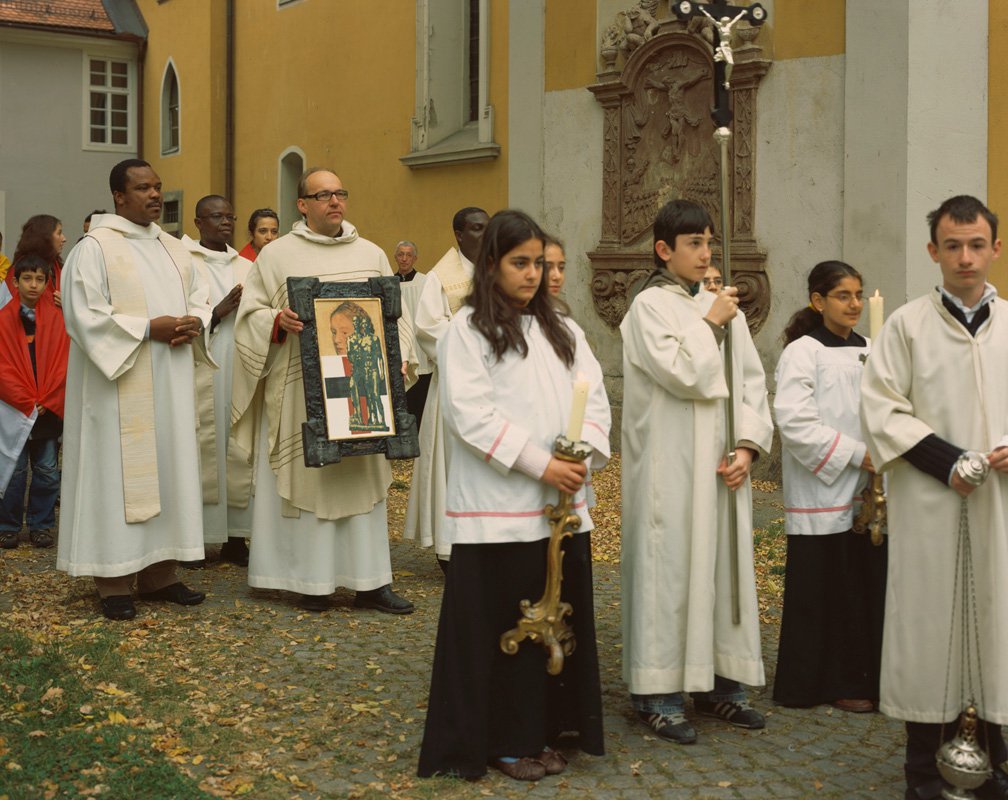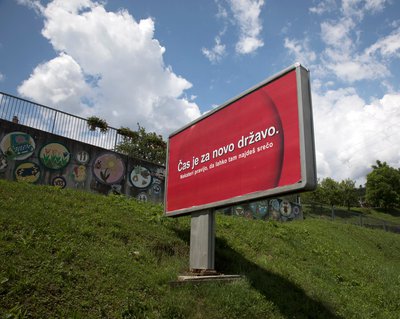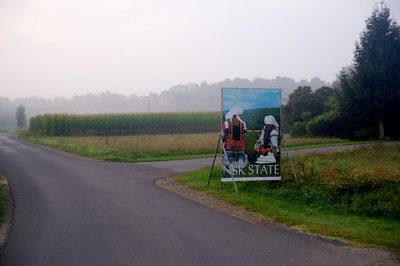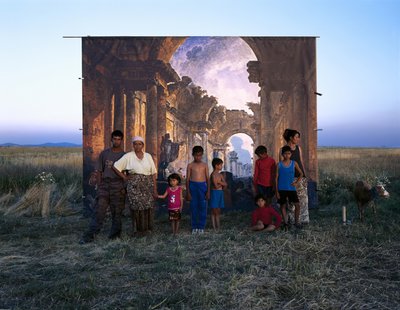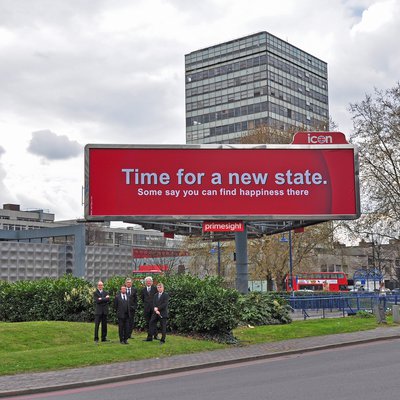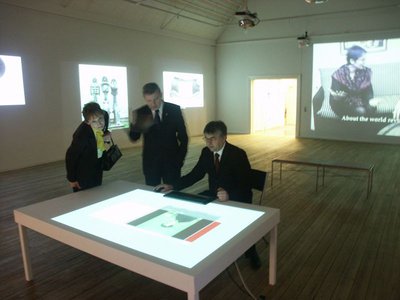Irwin
Država v času / State in Time
Exhibition in Dolenjski Muzej, Novo Mesto, Slovenija
In the exhibition will be included also Words from Africa, which was done together with NSKSTATE.COM
Opening speech by Peter Mlakar from Department of Pure and Applied Philosophy at NSK
State in Time
The NSK State came into being in 1992 as a result of the transformation of Neue Slowenische Kunst into the NSK State in Time. The Neue Slowenische Kunst collective (NSK) was formed by three founding groups – Irwin, Laibach and the Gledališče sester Scipion Nasice theatre group – back in 1984, still within the framework of the former Socialist Federal Republic of Yugoslavia. Collaboration, a free flow of ideas among individual members and groups, a declarative copyleft, which was not limited even by the indication of authorship, as well as mutual assistance and joint planning of particular moves and actions were key for the development and operation of NSK, although the groups were autonomous in their activities. Awareness of the specific conditions for operation in the field of art in the then Yugoslavia, which was largely defined by the closedness of the art system and a valorization system adjusted to local needs, led to the concentration of critical mass and confrontation with the art system. The antagonism generated in this way, as a consequence, clearly delineated the contours of and subjectivized particular groups and of NSK as a whole. Self-evidently, in conditions of strained relationships, the responsibility for art production and its reflection lay solely with us, and it was precisely through steering this confrontation that we established our autonomy. In short, collaboration and common wealth were the basis and the inevitable consequence of Neue Slowenische Kunst’s positioning in relation to the cultural and political reality of the Socialist Federal Republic of Yugoslavia.
"Nature is by the art of man, as in many other things, so in this also imitated, that it can make an artificial animal"
With the collapse of socialism in the beginning of the 1990s and the disintegration of Yugoslavia, the conditions of our operation changed radically as well, affecting the transformation of Neue Slowenische Kunst into the NSK State in Time in 1992. Along with the emergence of a multitude of new states, some of which, among them Slovenia, achieved the status of an independent state for the first time ever in history, NSK too objectified itself in the form of state. Instead of to a territory, however, NSK assigns the status of state to thinking, which alters its boundaries in accordance with the movements and changes of its symbolic and physical collective body. The commonwealth (state) is created by the speech act performed in making the civil covenant, according to Thomas Hobbs, who also writes in Leviathan: ”Nature is by the art of man, as in many other things, so in this also imitated, that it can make an artificial animal." This artificial animal (person) is the commonwealth. At the time of its formation, the NSK State in Time was defined as an abstract organism, a suprematist body, installed in a real socio-political space as a sculpture, consisting of concrete body hear, the movement of spirit, and the work of its members. In fact, the NSK state exists precisely through appearances in a variety of projects, which follow one another through time, drawing out its image and content as a kind of outline drawing, which establish and multiply relations among its citizens and which gradually enable, through multiplication and layering, the appearance of articulations of concrete needs and initiatives.
Thanks to the particular circumstances at the beginning of nineties, it was possible for us to publish the passports of the NSK State in Time in cooperation with the Slovenian Ministry of Interior Affairs. For this reason, NSK passports are printed in the same printing-house, on the paper of the same quality and with the same protection measures (at least some of them, for instance special numbering) as Slovenia’s passports. As a result, NSK passports not only look like regular passports but also do not differ from the usual standards for such products with regard to the mode and quality of production. Up until now, more than two thousand persons have applied for and obtained our passports and thereby become the citizens of the NSK State in Time, while retaining their previous citizenship as you can imagine. Most of them, we believe, can be regarded as belonging to the so-called “art scene.” They may be artists or art lovers. This big group of NSK citizens comes primarily from the developed countries of Western Europe or the USA. It is possible to say that the majority of NSK’s population comes from the so-called first world. The reasons for taking NSK citizenship are primarily linked to their understanding of and participation in the field of contemporary art. Although the most numerous, this is not the only social group among NSK passport holders. At the time when we started issuing NSK passports, that is in the first half of the nineties, new states were emerging on a daily basis and the war in the territory of the former Yugoslavia was still going on. A lot of interest in NSK passports came precisely from these areas. The largest number of passports was issued in Sarajevo at the end of the war in 1995. Although we issued the majority of passports to people associated with contemporary art, the interest in our passports was not just artistic. At that time, the citizens of Bosnia and Herzegovina had serious problems traveling outside their country. There are many stories of how NSK passports helped people to cross borders more easily than if using the Bosnian passport. For a certain period of time, the NSK passport was defined by its usefulness and hence its understanding differed radically from the usual view of it as an artefact. Being aware that the NSK passport does not enable them to cross national borders, that it cannot be a replacement for other documents, a lot of them took a risk and used it in cases of necessity as a functional replacement of their passports.
Thus, NSK passport holders have so far been closely related to the field of art and although the reasons for possessing the passport differ according to the position and status of particular passport holders, it is possible to maintain that the NSK passport is understood as an artefact which was, in certain cases and out of necessity, also used for non-artistic purposes.
But about three years ago, applications for the NSK passport began coming from Africa: from Nigeria or more precisely from Ibadan. And among those who are sending passport applications from different addresses in Europe – beside Ibadan, the most common address for Nigerians seeking NSK passport is London – a great majority give Ibadan as their place of birth. It started slowly but in short time the number of applications from Nigerians has exceeded 1000. As most of the applications are coming from the same city, it is possible to conclude that the information spreads from person to person. The cost of the passport is not high, but for the habitants of so-called third world is hardly unimportant. We seriously doubt that the interest of people from Nigeria in getting the NSK passport is related to art. It seams more likely that in the third world NSK passports have ceased to be artefact and became useful documents. What is interesting – apart from the way in which this information spreads – is why, where, for whom and how this is useful.
How a symbolical object that has been sold in the market of the first world for fifteen years and is recognized – regardless of its ambiguity or precisely because of its ambiguity – as an art object has become functional document in the third world. In short, how the word became flesh.
How to highlight the close encounter of two totally disparate worlds; the comparatively complex, highly sophisticated and abstract space of modern art on the one hand, and the politically, culturally and economically deeply destabilized third world, where mere survival is often a key issue and from where people emigrate in masses driven by a desire for a better life? Europe is the most coveted destination and year after year the media report on the terrible tragedies many of them experience primarily as victims of shipwrecks during expensive and dangerous illegal sea voyages. Two worlds so far apart from each other that their encounter can only be understood as a result of modern technologies, of the internet, which enables the flow of information even where there was none before.
The results of NSK citizens’ self-organization manifest themselves ever more clearly at a totally different level yet in unusual accord with what has been said so far. An important fact is that NSKSTATE.COM, a key domain offering information about NSK, is organized and managed by NSK citizens. Around this internet project and through it, communication among NSK citizens has gradually been established and developed, recently outgrowing into joint actions, projects and so on. In this case, too, the “artefact” transforms itself into the reality of operation. In any case, the majority of NSK citizenship applicants from the Ibadan area, too, obtained information precisely through the internet. The number of letters sent to NSKSTATE.COM in which people ask for information, explain why they urgently need the passport, and describe their qualities which should qualify them for citizenship is in the thousands.
